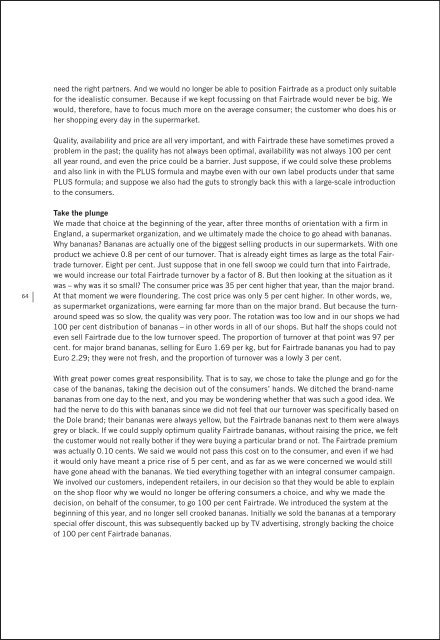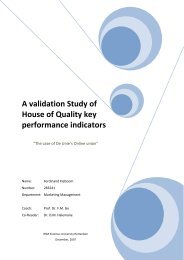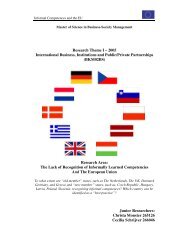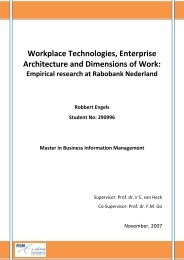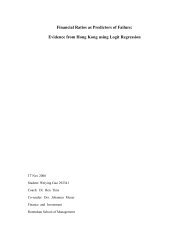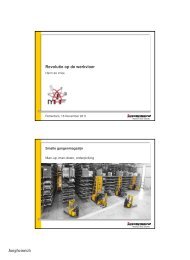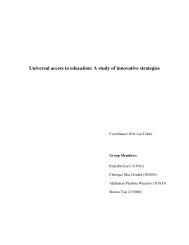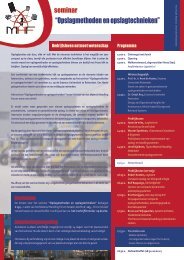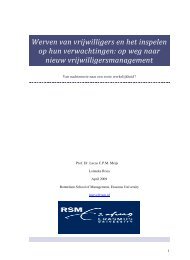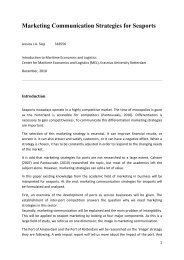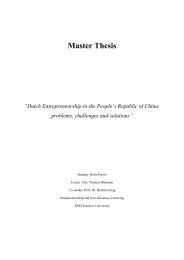Download With great power comes great responsibility (pdf) - ERIM
Download With great power comes great responsibility (pdf) - ERIM
Download With great power comes great responsibility (pdf) - ERIM
Create successful ePaper yourself
Turn your PDF publications into a flip-book with our unique Google optimized e-Paper software.
64<br />
need the right partners. And we would no longer be able to position Fairtrade as a product only suitable<br />
for the idealistic consumer. Because if we kept focussing on that Fairtrade would never be big. We<br />
would, therefore, have to focus much more on the average consumer; the customer who does his or<br />
her shopping every day in the supermarket.<br />
Quality, availability and price are all very important, and with Fairtrade these have sometimes proved a<br />
problem in the past; the quality has not always been optimal, availability was not always 100 per cent<br />
all year round, and even the price could be a barrier. Just suppose, if we could solve these problems<br />
and also link in with the PLUS formula and maybe even with our own label products under that same<br />
PLUS formula; and suppose we also had the guts to strongly back this with a large-scale introduction<br />
to the consumers.<br />
Take the plunge<br />
We made that choice at the beginning of the year, after three months of orientation with a firm in<br />
England, a supermarket organization, and we ultimately made the choice to go ahead with bananas.<br />
Why bananas? Bananas are actually one of the biggest selling products in our supermarkets. <strong>With</strong> one<br />
product we achieve 0.8 per cent of our turnover. That is already eight times as large as the total Fair -<br />
trade turnover. Eight per cent. Just suppose that in one fell swoop we could turn that into Fairtrade,<br />
we would increase our total Fairtrade turnover by a factor of 8. But then looking at the situation as it<br />
was – why was it so small? The consumer price was 35 per cent higher that year, than the major brand.<br />
At that moment we were floundering. The cost price was only 5 per cent higher. In other words, we,<br />
as supermarket organizations, were earning far more than on the major brand. But because the turn -<br />
around speed was so slow, the quality was very poor. The rotation was too low and in our shops we had<br />
100 per cent distribution of bananas – in other words in all of our shops. But half the shops could not<br />
even sell Fairtrade due to the low turnover speed. The proportion of turnover at that point was 97 per<br />
cent. for major brand bananas, selling for Euro 1.69 per kg, but for Fairtrade bananas you had to pay<br />
Euro 2.29; they were not fresh, and the proportion of turnover was a lowly 3 per cent.<br />
<strong>With</strong> <strong>great</strong> <strong>power</strong> <strong>comes</strong> <strong>great</strong> <strong>responsibility</strong>. That is to say, we chose to take the plunge and go for the<br />
case of the bananas, taking the decision out of the consumers’ hands. We ditched the brand-name<br />
bananas from one day to the next, and you may be wondering whether that was such a good idea. We<br />
had the nerve to do this with bananas since we did not feel that our turnover was specifically based on<br />
the Dole brand; their bananas were always yellow, but the Fairtrade bananas next to them were always<br />
grey or black. If we could supply optimum quality Fairtrade bananas, without raising the price, we felt<br />
the customer would not really bother if they were buying a particular brand or not. The Fairtrade premium<br />
was actually 0.10 cents. We said we would not pass this cost on to the consumer, and even if we had<br />
it would only have meant a price rise of 5 per cent, and as far as we were concerned we would still<br />
have gone ahead with the bananas. We tied everything together with an integral consumer campaign.<br />
We involved our customers, independent retailers, in our decision so that they would be able to explain<br />
on the shop floor why we would no longer be offering consumers a choice, and why we made the<br />
decision, on behalf of the consumer, to go 100 per cent Fairtrade. We introduced the system at the<br />
beginning of this year, and no longer sell crooked bananas. Initially we sold the bananas at a temporary<br />
special offer discount, this was subsequently backed up by TV advertising, strongly backing the choice<br />
of 100 per cent Fairtrade bananas.<br />
Results. The choice of 100 per cent Fairtrade bananas resulted in100 per cent distribution of Fairtrade.<br />
The increase in turnover amounted to 9 per cent, and I can tell you this was in a falling market for<br />
bananas, and the PLUS turnover was not on this level. If only that were true, as far as the total turn -<br />
over is concerned. In short, the customer did not abandon us, and started buying more bananas from<br />
us. Not unimportantly, we gained a lot of publicity, a lot of free publicity, and the customers did not<br />
seem to mind that the choice had been made for them. Due to the limited sales of Fairtrade we<br />
previously paid $1,200 on a yearly basis; now we pay, willingly I might add, $400,000 on an annual<br />
basis. <strong>With</strong> this decision, we have moreover also become, in one fell swoop, the country’s largest seller<br />
of Fairtrade. So, on this point, we are bigger than Albert Heijn. And now we are turning our sights on<br />
tea, coffee and cocoa, all under the PLUS own brand label, because we believe linking the PLUS own<br />
brand label and Fairtrade will also turn these products from niche to mainstream. We will shortly also<br />
be introducing 100 per cent Fairtrade pineapples into our PLUS supermarkets. Soon you will also be<br />
able to buy 100 per cent Fairtrade tea, with our own brand label.<br />
Concluding<br />
Production must continue to meet the requirements of quality and availability, this is incredibly<br />
important. My visits to the banana plantations have convinced me that large and small businesses<br />
are very well able to meet these requirements. The price should be acceptable, and the example of<br />
the bananas has shown that 5 per cent is definitely acceptable. The formula must be chosen with<br />
care, and communication and investment must be continuous. Ultimately the decision is to appeal to<br />
the mainstream target group instead of focussing on the niche market. Dare to make the consumer’s<br />
choice for him. Fairtrade as a brand, in combination with our own label formula, in our point of view,<br />
differentiates it from the major brands. But as management you must be committed to the concept<br />
and be prepared to go for it. Use your <strong>power</strong> right across the chain. And, finally, get involved, get to<br />
know how the system really works. Among other things, my trip to Colombia with Peter, personally<br />
really helped me in this respect. You have had the film, this is the last thing. PLUS is a commercial<br />
enterprise which is willing to make decisions, after all we have a business to run – that much will be<br />
clear. The <strong>responsibility</strong> for brand value within Fairtrade is not based on idealism, but on realism.<br />
Commerce and Fairtrade for supermarket organizations can go hand in hand, and we ultimately<br />
believe in sustainability and the improvement of working conditions, by means of a fair price. As far<br />
as we are concerned this is well worth the effort.<br />
65


